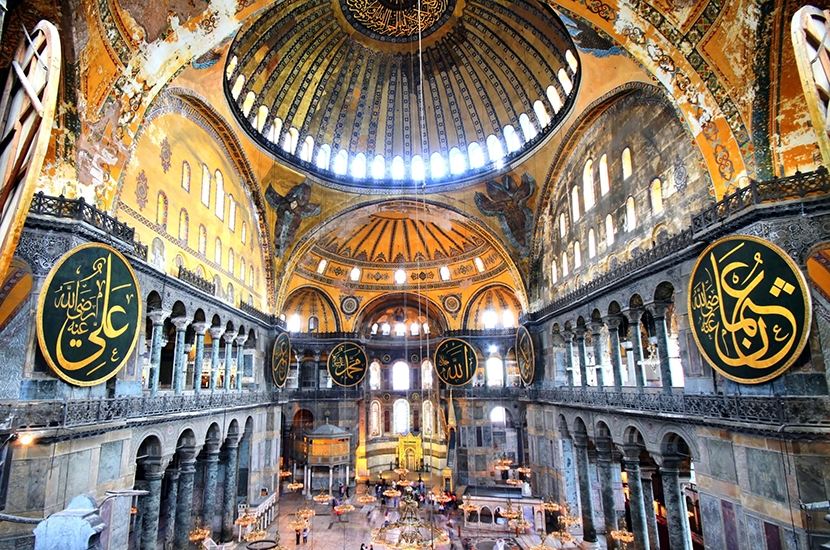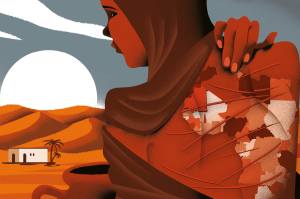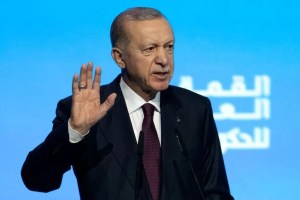It is official: Hagia Sophia, for a thousand years the world’s largest cathedral, and since 1934 a museum, is to be turned back into a mosque. Ever since I heard of the possibility, I have been praying it would not be so because of the impact it will have on Muslim-Christian relations in Turkey, the Middle East and beyond. A suitably purged and compliant judiciary, however, has bowed to the wishes of the authoritarian President Erdogan that Turkey should become more Islamic and less secular.
There has been a church on the site since 360 AD and the present building dates from the reign of Justinian in the mid-sixth century. When Mehmed II conquered Constantinople in 1453 and renamed it Islamople or Istanbul, Hagia Sophia was converted into a mosque and remained thus until the secular nationalists, led by Kemal Atatürk, turned it into a museum open to all. Such a turning of a cathedral into a mosque is not unique. Long before then, the Cathedral of St John the Baptist in Damascus had been turned into the Umayyad mosque and the Fatimid Caliph Al Hakim had razed the Church of the Holy Sepulcher to the ground, sparking the Crusades.
When the armies of Islam swept through the Middle East, sharia law permitted the conquered peoples, Jews, Christians and Zoroastrians, to retain their places of worship, provided they sought permission from Muslim rulers to repair them. They could not display any signs of their faith outside the buildings, nor could they ring bells to call their people to worship. They were not allowed to build new places of worship. In practice, as we have seen, even the restrictive provisions were not observed and places of worship were either taken over or destroyed.
Many point out that such destruction and occupation is not unique to the Islamic world — they claim that famous mosques like those of Cordoba and Seville in Spain were taken over or destroyed after the Reconquista. Where Cordoba is concerned, there had been a church where the Islamic rulers built their mosque, but in Seville there does not seem to be any evidence that the Almohad mosque, located where the present cathedral stands, was built on the site of a pre-conquest church, though the population there, as elsewhere on the Iberian Peninsula, was unwillingly subjugated to Muslim rule.
Human rights organizations have been saying for some time now that freedom of thought, expression and belief has been declining in Turkey for several years. Another Hagia Sophia, this one in Nicaea, where the Second Council of Nicaea was held in 787, has already been turned into a mosque. The seminary for training clergy of the Ecumenical Patriarchate at Halki remains closed and there are widespread allegations of government interference in the life of the Armenian Church. Protestant churches have been attacked by extremists and church workers injured or even killed. Foreign church workers are often arrested and deported. I was present at a Turkish Church celebration, in a prominent hotel, which was broken up by the police on the grounds that we did not have a permit to meet.
Turkey is not alone in this situation. The single most frequent reason for clashes between Christians and Muslims in Egypt is attempts by mobs either to prevent a church being built or repaired or to destroy it if it has been built already. I asked a senior official in Iran how many churches had been built since the Islamic Revolution. He replied: ‘None, the Christians don’t need them!’ In fact, some have been seized, others closed and yet others demolished. In Pakistan, churches are often targeted by mobs and congregations fired on or bombed to prevent them worshipping in a particular locality. When I was a bishop there, some middle-class professionals urged me not to build a church in their area. One we did build has not been allowed to open because of pressure from the wealthy community which surrounds the poor Christians. In Nigeria, churches are often the first port of call for Boko Haram and other extremists. Churches are burnt down, clergy murdered and the people attacked with deadly weapons. It is a devastating experience to stand in the burnt-out shell of a church attacked in this way.
[special_offer]
In such a climate, surely states like Turkey should be upholding freedom of belief and worship rather than further jeopardizing them by jingoistic actions like converting churches into mosques? To some extent, we can relativize the past and agree that people were acting according to religious and cultural norms of the time. There is no justification for it now. As far as I know, no Christians today are planning to turn mosques into churches. Where religious and cultural freedom is being violated, as with Uighur Muslims and Christians in China or Rohingya Muslims and Christians in Myanmar, the whole civilized world stands united in condemnation of it. In the West, Muslims are free to worship and to build mosques for their common life. Will they join in with others to appeal to the Turkish authorities not to take this regressive step with regard to Hagia Sophia?
For many years now, I have taken part in Christian dialogue with Muslims. The question of reciprocity often comes up. Some Christians and others ask: if Muslims have freedom of worship in the West and other non-Muslim settings, shouldn’t Christians and people of other faiths have similar freedoms in the Muslim world? I have tried not to make reciprocity a ‘tit for tat’ matter, but rather to work for the possibility of all sides affirming fundamental freedoms for their fellow citizens — including, of course, freedom to have places of worship where they can worship freely. Is the Turkish leadership willing to affirm such a position?
Turkey is a signatory to the Universal Declaration of Human Rights, Article 18 of which guarantees freedom of thought, expression and belief, as well as the right to manifest such belief alone or with others and to express such belief in worship and observance. Will Turkey stand with those nations that unequivocally uphold such fundamental freedoms? Or will it join those obscurantist nations that systemically deny such freedoms to their citizens — especially if they are minorities?


















